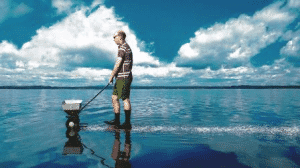[vc_row][vc_column][vc_column_text] Protecting your watershed begins in your back (and front) yard!
Protecting your watershed begins in your back (and front) yard!
The chemicals and debris on your lawn and garden will eventually find its way into our waterways causing contamination and reducing water quality.
The Sustainable Lawn Care Program will help you reduce your impacts on our waterways. Here are some easy steps that you can follow! Start slow! You do not need to do all of these steps as once, every little bit helps protect our water!
- Plant native plants! Native plants are adapted to the conditions of the area and require fewer chemicals for growth and pest management.
- Compost! Help reduce debris that enters and decays in our waterways. Large amounts of decomposing organic matter (such as grass and leaf litter) reduces the oxygen content of that water body which can lead to poor water quality.
- Harvesting rainwater! Rain barrels can be used to capture some of the water that falls on your rooftop– diverting it away from the storm sewer system and allowing it to be reused as water for your plants.
- Correct use of OR alternatives to lawn and garden chemical! Be smart with your use of fertilizers and pesticide. Follow instruction on packaging closely and avoid using chemicals when wet weather is in for forecast. Switching to organic lawn care not only creates a better environment for your family but will help you protect your watershed!
- Don’t mow too short! Keep your grass at 3 ½ inches or higher. This will help water soak into your lawn better, and shade out weeds.
[/vc_column_text][/vc_column][/vc_row][vc_row margin_top=”50″][vc_column][vc_column_text]
Tinker’s Creek Watershed Community Events
2013 Sustainable Lawn Care and Landscape Workshop
This workshop is hosted by Tinker’s Creek Watershed Partners and provides the opportunity for TCWP member community municipal grounds and maintenance staff to receive training as required through Stormwater Program’s Minimum Control Measure 6: Pollution Prevention/Good Housekeeping. The workshop also offers 2 hours of CEUs from the Ohio Department of Agriculture for pesticide applicators. See below for more information
When: April 29, 2013, 8am to noon
Location: Twinsburg City Hall, Council Chambers, 10075 Ravenna Rd.
Cost: Free to Tinker’s Creek Watershed Partner community and business members
Pesticide Applicator CEU offered (see below for re-certification requirements*):
- 1 hour from category Industrial Vegetation (5)
- 1/2 hour from category Ornamental (6a)
- 1/2 hour from category Ornamental (6a)
Presenters:
Barb Holtz, Cleveland Metroparks
Greg Mazur, Davey Institute
Leslie Marcuse, Good Nature Organic Lawn Care
Andrew Pratt, Cuyahoga County Community College
More information to come.
Minimum Control Measure 6: Pollution Prevention/Good Housekeeping
Developing and implementing a program with the goal of preventing or reducing pollutant runoff from municipal operations. The program must include municipal staff training on pollution prevention measures and techniques (e.g., regular street sweeping, reduction in the use of pesticides or street salt, or frequent catch-basin cleaning).
Commercial Pesticide License Requirements
To keep a commercial pesticide applicator license current, applicators must take 5 hours of recertification credit every 3 years. The specific requirements are:
1 hour of Core required
+ 1/2 hour in each category on applicator license required
+ additional time in any category (after completing 1 hour of core and each category requirement)
= 5 hours of time for re-certification[/vc_column_text][/vc_column][/vc_row][vc_row margin_top=”50″][vc_column][vc_column_text]
2012 Sustainable Lawn Care and Landscape Workshop
The Sustainable Lawn Care and Landscaping workshop brought over 60 participants to Glenwillow Council Chambers on February 24, 2012. Participants heard from experts in their fields. Leslie Marcuse from Good Nature Organic Lawn Care discussed the benefits of organic lawn care, Andrew Pratt from theCleveland Botanical Garden discussed integrated pest management for water friendly pest control, and Barb Holtz from the Cleveland Metroparks and Bob Kehres from Ohio Prairie Nursery discussed the benefits of planting native plants.
We will hold an additional workshop in the Spring of 2013.
For more information contact Babette at [email protected].[/vc_column_text][/vc_column][/vc_row]
